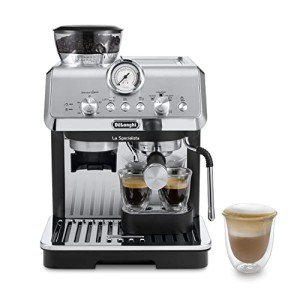Home Use Espresso Machines: A Comprehensive Guide
Espresso machines have actually become a staple in many homes as coffee lovers look for to reproduce café-quality brews in the comfort of their cooking areas. The rise in popularity has caused a diverse market filled with different designs, features, and costs. This article intends to supply a helpful summary of home use espresso machines, assisting readers navigate their options effectively.
Comprehending Espresso Machines
Espresso machines work by requiring warm water through finely-ground coffee under high pressure, resulting in a concentrated coffee beverage understood as espresso. There are numerous kinds of espresso machines categorized based upon their developing methods and level of automation. The most typical types include:
- Manual Espresso Machines: These require the user to manage the pressure and water circulation, allowing for a more hands-on coffee-making experience.
- Semi-Automatic Espresso Machines: These provide automatic control over water pressure, while the user manually grinds and tamps the coffee.
- Automatic Espresso Machines: With the push of a button, these machines immediately control the circulation of water, making it easier to brew espresso with constant results.
- Super-Automatic Espresso Machines: These all-in-one machines deal with grinding, tampering, brewing, and even milk frothing, making them ideal for users searching for benefit.
- Capsule or Pod Machines: These use pre-packaged coffee pods to develop espresso with minimal effort, but they limit option in developing methods and flavors.
Table: Comparison of Espresso Machine Types
| Type | Control Level | Ease of Use | Cleaning up Level | Ideal For |
|---|---|---|---|---|
| Manual | User-controlled | Moderate | High | Coffee perfectionists |
| Semi-Automatic | Partial automation | Moderate | Moderate | Home baristas |
| Automatic | Completely automated | Easy | Low | Busy people |
| Super-Automatic | Completely automated | Very easy | Extremely low | Convenience applicants |
| Capsule/Pod | Fully automated | Very easy | Really low | Casual drinkers |
Secret Features to Consider
When picking a home use espresso machine, it's necessary to consider various features that can significantly affect the quality of espresso and user experience.
- Pressure: Look for machines that offer a minimum of 9 bars of pressure, as this is considered optimal for brewing espresso.
- Boiler Systems: Single vs. dual boiler systems determine temperature stability and the ability to brew espresso and steam milk concurrently.
- Grinder: Integrated mills permit newly ground coffee, which enhances taste. Think about Portable Espresso Machines with adjustable grind settings.
- Milk Frother: For those who delight in coffees and lattes, an integrated steam wand or automatic frother is important.
- Size and Design: Consider your kitchen area and visual choices. Machines come in various sizes, from compact to large setups.
- Price: Home espresso machines can range from a couple of hundred to numerous thousand dollars, so it's vital to establish a budget before exploring alternatives.
Pros and Cons of Home Use Espresso Machines
| Pros | Cons |
|---|---|
| Convenience of brewing coffee in the house | Initial financial investment can be high |
| Quality of espresso is often superior | Needs some ability, specifically with manual machines |
| Capability to experiment with tastes | Maintenance and cleansing can be labor-intensive |
| Can save cash in the long run | Not all machines will match every coffee preference |
Upkeep and Cleaning Tips
Preserving an espresso machine is important for extending its life and ensuring constant brew quality. Here are some useful tips:
- Regular Descaling: Minerals from water can develop in the machine. Home Espresso Machines -3 months, depending on water firmness.
- Daily Cleaning: Rinse portafilters, baskets, and steam wands after each use to prevent coffee oils from constructing residue.
- Use Filtered Water: This can help minimize mineral accumulation and improve the taste of coffee.
- Replace Gaskets and Seals: These elements may wear gradually and needs to be changed to preserve pressure and efficiency.
- Read the Manual: Each machine has particular care guidelines; following these will ensure longevity.
FAQs About Home Use Espresso Machines
Q1: What is the best budget espresso machine?The best budget espresso machine typically depends on specific requirements, however models like the DeLonghi EC155 or the Breville Bambino are popular amongst users for offering fantastic value. Q2: How long do home espresso machines normally last?With proper upkeep, home espresso machines can last anywhere from 5 to 15 years, depending on the quality of the machine and frequency of use. Q3: Can I make coffees and lattes with any espresso machine?While most espresso machines can make cappuccinos and lattes, having a trustworthy
steam wand or frother is essential for achieving the ideal milk texture.
Q4: Are super-automatic machines worth the investment?For those who focus on benefit and fast developing, super-automatic machines can be worth the financial investment, though they might do not have some customizability in brew strength and flavor. Q5: What kinds of coffee beans are best for espresso?While individual preference contributes, beans identified as" espresso "blends are generally roasted darker, developing rich flavors and a velvety texture when brewed.
Purchasing a home espresso machine can transform the day-to-day coffee routine into something special, elevating home brews to café quality. By comprehending the different kinds of machines, crucial functions to consider, upkeep requirements, and weighing the
pros and cons, consumers can make educated decisions that match their specific preferences. As the espresso culture continues to grow, no matter the option, every brew can be a delicious experience waiting to be relished.

